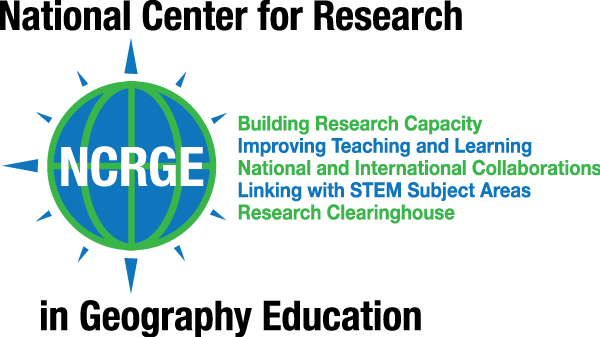NCRGE Announces First Round of Transformative Research Grants
The National Center for Research in Geography Education (NCRGE), a research coordination network funded by the National Science Foundation, has announced the first cohort of researchers funded by its Transformative Research grant program. This investment by NCRGE marks the beginning of a long-term and multifaceted project to elevate the quality, relevance, and sophistication of geography education research.
The concept of transformative research pervades the Road Map for 21st Century Geography Education project’s landmark report on geography education. By organizing new networks of geographers, educational researchers, and practitioners, NCRGE aims to build capacity for research in areas of geography education that were deemed by the Road Map Project to be highly significant for achieving broad-scale improvement in educational practices.
One research group, originating with Geographic Alliances in Maine, New Hampshire, and Colorado, will receive an NCRGE grant to develop a line of research in the area of assessment, with a specific focus on maps and spatial thinking in elementary school classrooms. Lara Bryant (Associate Professor of Geography, Keene State College) will serve as the Chair of this research group, which will also include Rebecca Theobald (Assistant Research Professor of Geography and Environmental Studies, University of Colorado at Colorado Springs), Steven Jennings (Associate Professor of Geography, University of Colorado at Colorado Springs), Cathleen McAnneny (Professor of Geography, University of Main at Farmington), Sue Lahti (Coordinator of Maine Geographic Alliance), and Beverly Ferrucci (Professor of Mathematics, Keene State College). They will work to develop a framework for understanding how students learn fundamental mathematics and spatial analysis skills using giant floor maps of each state. The primary goal of this project is to structure procedures for interacting with teachers, researchers, and Geographic Alliance Coordinators in order to prepare for future research investigating how experience on giant maps impacts students’ understanding of space and mathematical thinking. The transformative potential of this project is evident in the capacity building afforded by developing and testing research instruments and procedures capable of replication in multiple types of classrooms, schools, and districts. Geography faculty, education faculty, mathematics faculty, graduate students, and elementary school teachers will participate in these development and assessment activities, thereby ensuring a comprehensive approach to the project.
A second research group, to be led by John Harrington (Professor of Geography) and Thomas Larsen (Ph.D. student) at Kansas State University, plans to expand the learning progressions research of the GeoProgressions project. One of the key outcomes of GeoProgressions was the publication of a research handbook on learning progressions for maps, geospatial technology, and spatial thinking. Harrington and Larsen’s research group will build upon this prior work by researching learning progressions in the context of national geography standards for teaching and learning about places and regions. Whereas the literature on spatial cognition is relatively deep and interdisciplinary, much less is known about the ways children develop successively more complex and sophisticated knowledge of the geographic concepts of place and region. To evince a path forward, a workshop scheduled for fall of 2016 will bring together established learning progressions scholars, geography education and cognitive psychology researchers, early career geography education specialists, and teachers affiliated with the Kansas Geographic Alliance. The workshop will be designed to address the current state of knowledge related to K-12 teaching about places and regions, as a prelude to research that enables the development of learning progressions that capture the complexity and contested nature of places and regions. Following the workshop, the research group will collaboratively write a manuscript based on the workshop proceedings. This publication will be contributed to the existing GeoProgressions research clearinghouse as a resource to support future proposals and activities of this research group.
A third research group will focus its activities in the area of project-based learning (PBL). Patricia Solís (Research Associate Professor of Geography, Texas Tech University) and Niem Tu Huynh (AAG Research Fellow) will co-Chair an interdisciplinary and international group including Daniel Carpenter (Assistant Professor of Science Education, Texas Tech University), Lynn Ojeda (Principal of Academy High School in Plano, Texas), and Manuel Quintero (GIS Specialist, Authority for Governmental Innovation, Panama). Through a series of research meetings, the group will design a pilot study to analyze how authentic project-based learning classrooms can be connected internationally to support geographic and geospatial learning. U.S. secondary school students will engage remotely with Panamanian peers to populate an OpenStreetMap of areas in Panama’s Azuero Peninsula. Through observations of these learning spaces and interactions, the project will identify the key mechanisms and assessments of project-based learning environments using geospatial technologies. As one of the most transformative movements in 21st century education, PBL shows broad promise for effective teaching and learning of geography with geospatial technologies. There is a paucity of research that investigates the value of an international component to PBL for transforming geography learning, particularly linked to national standards and geospatial competencies. This project will build capacity for research of this nature by supporting new collaborations and contributing research instruments and related materials to the NCRGE research clearinghouse.
Representatives from the three research groups receiving NCRGE grants will present their projects during a research roundtable at the National Conference on Geography Education in Tampa on Saturday, July 30 from 11:00 am – 12:15 pm. The groups will also be featured on the program for the NCRGE Transformative Research Symposium that is being planned for the 2017 AAG Annual Meeting in Boston. This symposium will be an all day event on Saturday, April 8 and will feature guest speakers, paper and panel sessions, and grant-writing workshops for geography education research.
For more information about the National Center for Research in Geography Education, please visit www.ncrge.org.

Leave a Reply